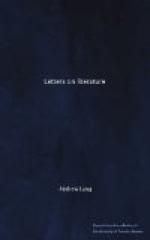TO A YOUNG AMERICAN BOOK-HUNTER
To Philip Dodsworth, Esq., New York.
Dear Dodsworth,—Let me congratulate you on having joined the army of book-hunters. “Everywhere have I sought peace and found it nowhere,” says the blessed Thomas a Kempis, “save in a corner with a book.” Whether that good monk wrote the “De Imitatione Christi” or not, one always likes him for his love of books. Perhaps he was the only book-hunter that ever wrought a miracle. “Other signs and miracles which he was wont to tell as having happened at the prayer of an unnamed person, are believed to have been granted to his own, such as the sudden reappearance of a lost book in his cell.” Ah, if Faith, that moveth mountains, could only bring back the books we have lost, the books that have been borrowed from us! But we are a faithless generation.
From a collector so much older and better experienced in misfortune than yourself, you ask for some advice on the sport of book-hunting. Well, I will give it; but you will not take it. No; you will hunt wild, like young pointers before they are properly broken.
Let me suppose that you are “to middle fortune born,” and that you cannot stroll into the great book-marts and give your orders freely for all that is rich and rare. You are obliged to wait and watch an opportunity, to practise that maxim of the Stoic’s, “Endure and abstain.” Then abstain from rushing at every volume, however out of the line of your literary interests, which seems to be a bargain. Probably it is not even a bargain; it can seldom be cheap to you, if you do not need it, and do not mean to read it.
Not that any collector reads all his books. I may have, and indeed do possess, an Aldine Homer and Caliergus his Theocritus; but I prefer to study the authors in a cheap German edition. The old editions we buy mainly for their beauty, and the sentiment of their antiquity and their associations.
But I don’t take my own advice. The shelves are crowded with books quite out of my line—a whole small library of tomes on the pastime of curling, and I don’t curl; and “God’s Revenge against Murther,” though (so far) I am not an assassin. Probably it was for love of Sir Walter Scott, and his mention of this truculent treatise, that I purchased it. The full title of it is “The Triumphs of God’s Revenge against the Crying and Execrable Sinne of (willful and premeditated) Murther.” Or rather there is nearly a column more of title, which I spare you. But the pictures are so bad as to be nearly worth the price. Do not waste your money, like your foolish adviser, on books like that, or on “Les Sept Visions de Don Francisco de Quevedo,” published at Cologne, in 1682.
Why in the world did I purchase this, with the title-page showing Quevedo asleep, and all his seven visions floating round him in little circles like soap-bubbles? Probably because the book was published by Clement Malassis, and perhaps he was a forefather of that whimsical Frenchman, Poulet Malassis, who published for Banville, and Baudelaire, and Charles Asselineau. It was a bad reason. More likely the mere cheapness attracted me.




